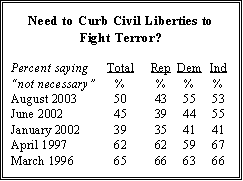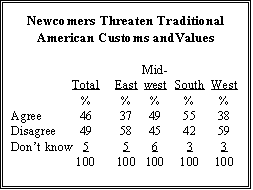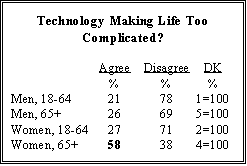Civil Liberties and Terrorism
For the first time since the Sept. 11 terrorist attacks, half of Americans say it will not be necessary for the average person to sacrifice civil liberties in the struggle against terrorism, while 44% believe such steps will be necessary. In three previous surveys since Sept. 11, 2001, majorities or pluralities felt it would be necessary for people to give up some civil liberties to curb terrorism in the U.S.
 As noted above, there is growing partisanship on this issue, as a declining percentage of Democrats feel that people will need to sacrifice civil liberties in the fight against terrorism. Only about four-in-ten (39%) Democrats say that today, a decline from 48% in June 2002 and 52% in a survey conducted that January. The shift among Republicans has been far smaller: 54% of Republicans believe the average person will have to give up some liberties to curb terrorism, compared with 56% in June 2002 and 60% in January of that year.
As noted above, there is growing partisanship on this issue, as a declining percentage of Democrats feel that people will need to sacrifice civil liberties in the fight against terrorism. Only about four-in-ten (39%) Democrats say that today, a decline from 48% in June 2002 and 52% in a survey conducted that January. The shift among Republicans has been far smaller: 54% of Republicans believe the average person will have to give up some liberties to curb terrorism, compared with 56% in June 2002 and 60% in January of that year.
The partisan gap is even larger over the government’s policy of holding suspected terrorists without trial. Overall opinion on this issue has been stable since June of last year 55% continue to support the policy. Partisan differences remain as substantial as they were then: Fully seven-in-ten (72%) Republicans favor the policy, compared with about half of independents (51%) and even fewer Democrats (46%).
Support for National ID Card
A majority of the public supports an antiterrorism measure that would require all citizens to carry a national identity card at all times to show a police officer upon request. But support is lower now than in the immediate aftermath of 9/11. Just over half today (56%) support the idea, while 40% oppose it. In mid-September 2001, 70% were in favor. Opinion about this issue does not break cleanly along partisan or ideological lines.
Republicans (60%) and Democrats (59%) both support the idea of a national identity card, while independents are somewhat less supportive (52%). Conservative Republicans (at 58%) are a bit less enthusiastic than moderate-to-liberal Republicans (65%); liberal Democrats (at 50%) are less supportive than conservative and moderate Democrats (63%). College graduates are split on the idea, while more than six-in-ten of those who did not go to college favor it.
Public Divided on Immigrants’ Cultural Impact
 While there is broad support for tighter curbs on immigration, the public is divided about the cultural impact of newcomers from other countries: 46% believe immigrants threaten traditional American customs and values, while 49% disagree.
While there is broad support for tighter curbs on immigration, the public is divided about the cultural impact of newcomers from other countries: 46% believe immigrants threaten traditional American customs and values, while 49% disagree.
Education is a major factor in attitudes on this issue. A solid majority of those with a high school education (56%) say immigrants threaten traditional American customs. Half as many college graduates (27%) agree.
Age also shapes these views. More than six-in-ten (63%) of those age 65 and older feel that immigrants threaten American values compared with 39% of those under age 30. In addition, negative views toward immigrants are greater in the South and Midwest than in the Northeast or West.
There is a modest partisan gap in attitudes toward immigrants, but it increases noticeably when ideology also is taken into account. Roughly twice as many conservative Republicans as liberal Democrats say immigrants threaten traditional customs (54% vs. 27%); among all Republicans and Democrats the gap is much smaller (55% of Republicans, 48% of Democrats).
Science and Technology
 American science and technology are admired by people around the globe. Most Americans also view advances in science and technology as beneficial rather than harmful, though some fears are evident.
American science and technology are admired by people around the globe. Most Americans also view advances in science and technology as beneficial rather than harmful, though some fears are evident.
A large majority (71%) disagrees with the statement that “technology is making life too complicated for me.” Concern about the complexity of technology is expressed most often by the less educated, and especially by older women. Among women age 65 and older, 58% say technology is making life too complicated far more than any other age group among men and women. There also are significant differences among religious groups: Nearly twice as many white evangelical Protestants (43%) as non-evangelicals (22%) think technology is making life too complicated.
The public expresses greater anxiety about whether science is going too far and hurting society rather than helping it. More than four-in-ten Americans (42%) worry that this is happening compared with 54% who are not concerned. Concern is greater among the less educated and among non-whites.
Environmental Protection
There is broad agreement among the public with regard to the value of environmental protection. More than eight-in-ten (86%) agree that there needs to be stricter laws and regulations to protect the environment, and about two-thirds (65%) agree that people should be willing to pay higher prices in order to protect the environment.
Aside from a small increase in the willingness to pay more for environmental protection (just 56% agreed in 1999), there has been little change in overall agreement with these statements since they were first asked in 1992. Similarly, 71% say the U.S. should put more emphasis on energy conservation than on developing new oil supplies, about the same level of agreement as last year.
Despite general agreement, partisan differences in the intensity of these opinions are evident. Over half of Democrats (58%) completely agree that stronger laws are needed to protect the environment; just 32% of Republicans feel this strongly. Twice as many Democrats as Republicans completely agree that energy conservation should take priority over increased oil production (38% vs. 19%). The gap in intensity is especially notable when partisanship and ideology are taken into account. Over half (52%) of liberal Democrats completely agree that the priority should be energy conservation over increased oil production; just 16% of conservative Republicans agree.
Crime and Punishment
Seven-in-ten Americans (72% ) think the criminal justice system should try to rehabilitate criminals and not just punish them, while nearly three-in-ten (29%) completely agree with this statement. Blacks are more likely than whites to agree (78% vs. 71%), with Hispanic opinion on par with whites.
Large majorities of both Democrats and Republicans endorse the idea of rehabilitating criminals, as well as punishing them. But liberal Democrats are more than twice as likely as conservative Republicans to completely agree (47% vs. 21%).
Tax System Unfair?
Half the public feels that “the tax system is unfair to people like me,” while 45% disagree. Despite their strong support for tax cuts, fewer than half of Republicans agree with this statement. By comparison, significantly higher percentages of Democrats and independents feel the tax system is unfair to people like them (55% and 53%, respectively).
Criticism of the tax system is widespread among African Americans and people with relatively low family incomes. Fully 72% of African Americans say the tax system is unfair to people like them, compared with 46% of whites. Among people with annual household incomes of $30,000 or less, more than half (56%) complain about the fairness of the tax system; just 39% of those with annual incomes of at least $75,000 agree.


